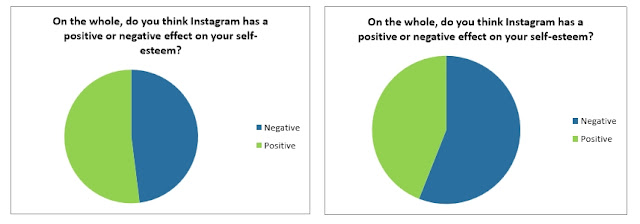I decided to research the effect of Instagram on self-esteem for teenage girls (11-18 yrs old)
 |
| www.unsplash.com |
 |
| Edited version of The Rosenberg Scale |
According to Rosenberg’s system, it would be ‘correct’ to suggest that Instagram evokes a feeling of ‘normal’
self-esteem as on the whole it received a score of 55% (where below 50% is considered low). HOWEVER, what is shocking is that actually, Instagram is 5% away from
correlating with ‘low’ self-esteem for teenage girls. We cannot conclude that
Instagram helps to influence a ‘normal’ self-esteem when the proximity is so
close to ‘low’ in this case. What defines ‘normal’ anyhow? I will conclude that Instagram is threatening to self-esteem, i.e.
to be something that is likely to cause harm to someone or something.
A statistic that stood out was
that a majority agreed that ‘Instagram makes me feel useless at times’, and there was
an indecisive conclusion as to ‘Instagram makes me feel like a person of worth’
(41% disagreeing and 41% agreeing). I would like to be so bold as to suggest
that as a society, we are confused about the implications of Instagram for our
self-esteem, i.e. there is a fine line between what we may consider as positive
or negative.
The reason for the two versions is because, at first sight it seemed 52% believe Instagram has a positive effect on their self-esteem (great news right?!) HOWEVER, when I looked at the reasons why girls thought it was positive/negative (from the question that followed), the results were shocking.
The weight of the reasoning from those who suggested Instagram has a negative effect on their self-esteem is heavier than those who incorrectly believe it to be positive.
‘All I
want is to look like them, be like them, do what they do but I know I will
never get to’
Explanations of ‘comparison’ arose in 43% of participants’
responses as a reason for its negative effect. The element of comparison is
consistent throughout all research undertook (e.g. the main reason for the use of
Instagram: ‘to see what other people are doing’). The elements threatening to
self-esteem is the admitted inaccurate representation of one’s life[1],
that “some people…totally change what they look like”[2]
and the extent to which we’re exposed to Instagram, ‘consistently throughout
the day’ (also results from my research). Instagram promotes pixilated
perfection: pixilated, sometimes unattainable,
perfection (in terms of image, travel, achievement, lifestyle, fashion etc.) Our
perception of the lives of others is distorted and thus the perception of the
value of our own lives is distorted, i.e. we compare our backstage to someone
else’s edited, filtered, highlight reel. As seen by this participant’s
response (and others responses), the awareness that what people post on
Instagram is unattainable seems known, yet how to stop it affecting how we
view ourselves is unknown.
‘People put comments saying that you are not worth living and it takes a toll of your self-confidence’
The anonymous, digital relationships on Instagram allow anonymous, digital expression of opinion (whether valid or not). Psychologists express that “your ideas about what others think of you hinge on your self-concept”[3]. Therefore, the destructive views of other people do inevitably affect the way we view ourselves; our self-esteem.
‘If I don't get likes I know the picture is ugly so I just delete it’
Others
said they base their happiness on the amount of likes they get. Despite
some understanding the unattainable perfection promoted by Instagram, teenage
girls are still stressing to obtain external validation and perceived
perfection, deleting those Instagram pictures that don’t live up to societal
constructions of value through likes. It seems we are
using Instagram to find a version of ourselves that receives the most positive
engagement through likes, follows and comments.
‘Because you can post good selfies and feel great and get lots of likes and it makes me feel like everyone likes me’ (Someone's justification of the 'positive' effect on Instagram)
Although we can use the social network to build and encourage one another (a vital biblical principle), there is a fine line between receiving this out of love and obsessing over receiving this in order to justify our existence and base validation of ourselves. Our self-esteem cannot rest on external, temporal validation through Instagram. The pie charts above show the shift in results if I were to take each response that correlated the number of likes on their photos to an increase in self-esteem and express that as having a negative effect on self-esteem. The results shift to 56% of girls equating Instagram as having a negative effect on their self-esteem.
[1]
Mollie Bylett (http://www.molliebylett.com/)
[2] Olivia Fleming, ‘How Instagram is ruining our self-esteem’,
http://www.elle.com/beauty/tips/a2531/how-instagram-is-ruining-our-self-esteem/,
(Elle Magazine, 2014)
[3]
Carlin
Flora, ‘Metaperceptions: How do you see
yourself?’, https://www.psychologytoday.com/articles/200505/metaperceptions-how-do-you-see-yourself,
(Psychology Today, 2015)
j

Very useful post. This is my first time i visit here. I found so many interesting stuff in your blog especially its discussion. Really its great article. Keep it up. whohah
ReplyDeleteIf you want to join followers on Instagram but you are put off by not knowing how to use it, then you should read ahead to know everything there is to know about Instagram.
ReplyDeleteI think this is among the most vital information for me and I am satisfied reading your article.
ReplyDeletehttps://blog.mindvalley.com/causes-of-low-self-esteem
I Was Eagerly Looking For Content Like This, Right To The Point And Detailed As Well Accordingly Depending Upon The Matter/Topic. You Have Managed This Greatly For Sure 토토사이트
ReplyDelete항상 귀하의 사이트를 방문하는 것이 흥미 롭습니다. 정말 훌륭한 정보, 공유해 주셔서 감사합니다. 이것은 내 학습에 많은 도움이 될 것입니다 먹튀검증업체
ReplyDelete